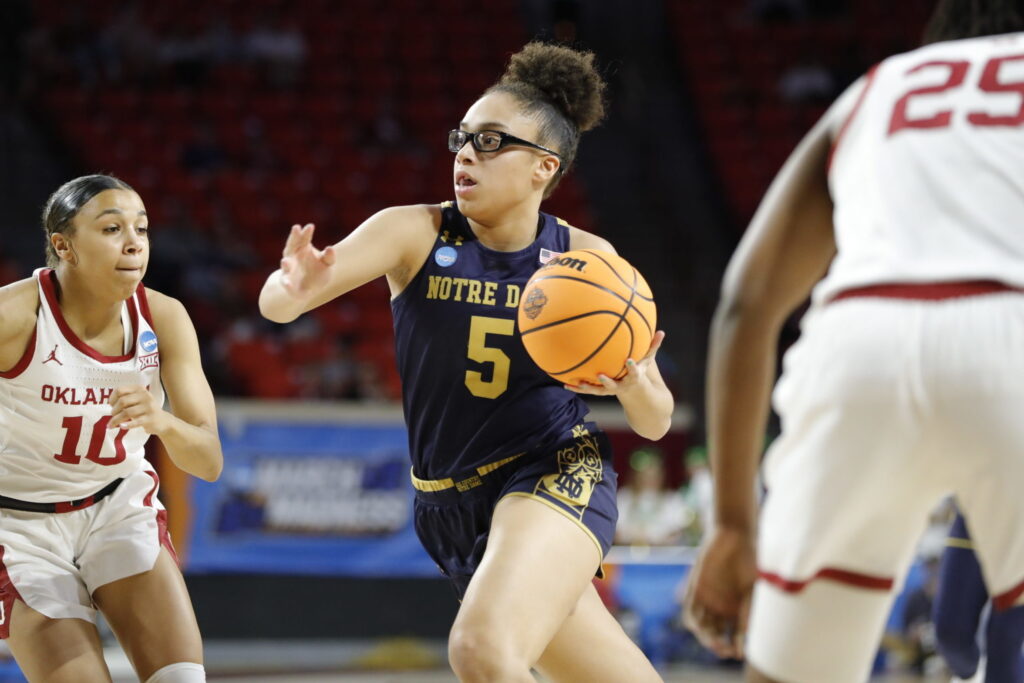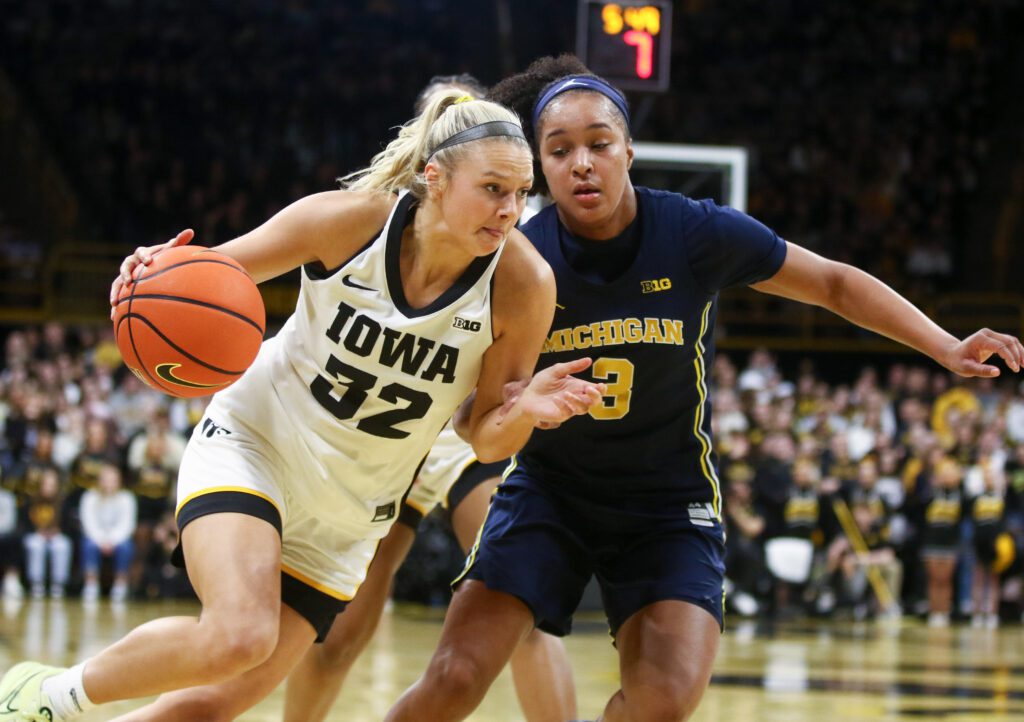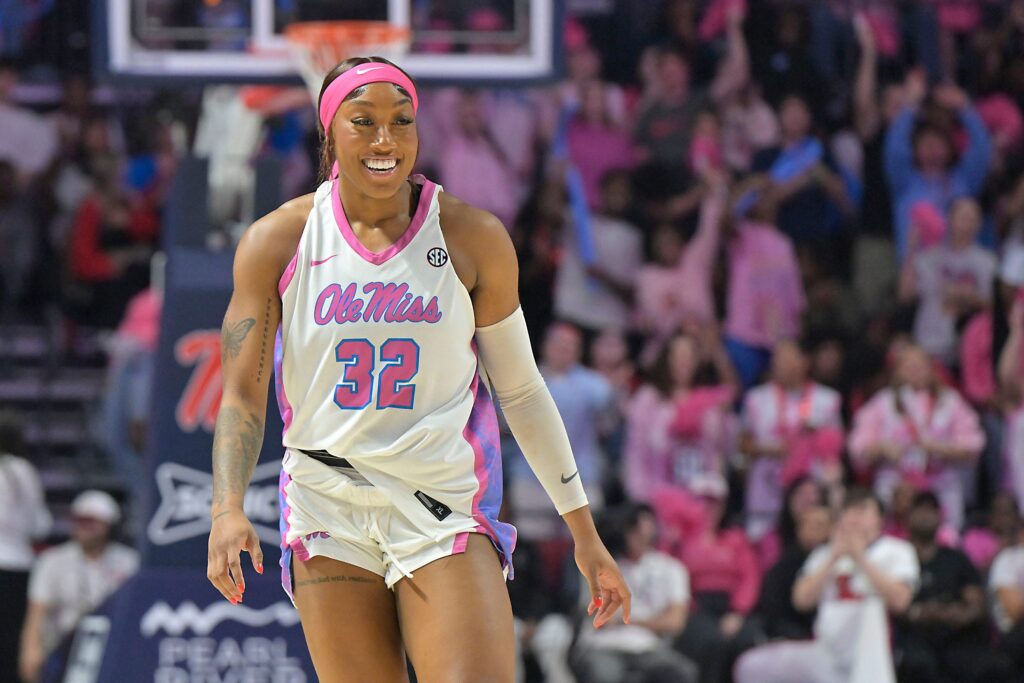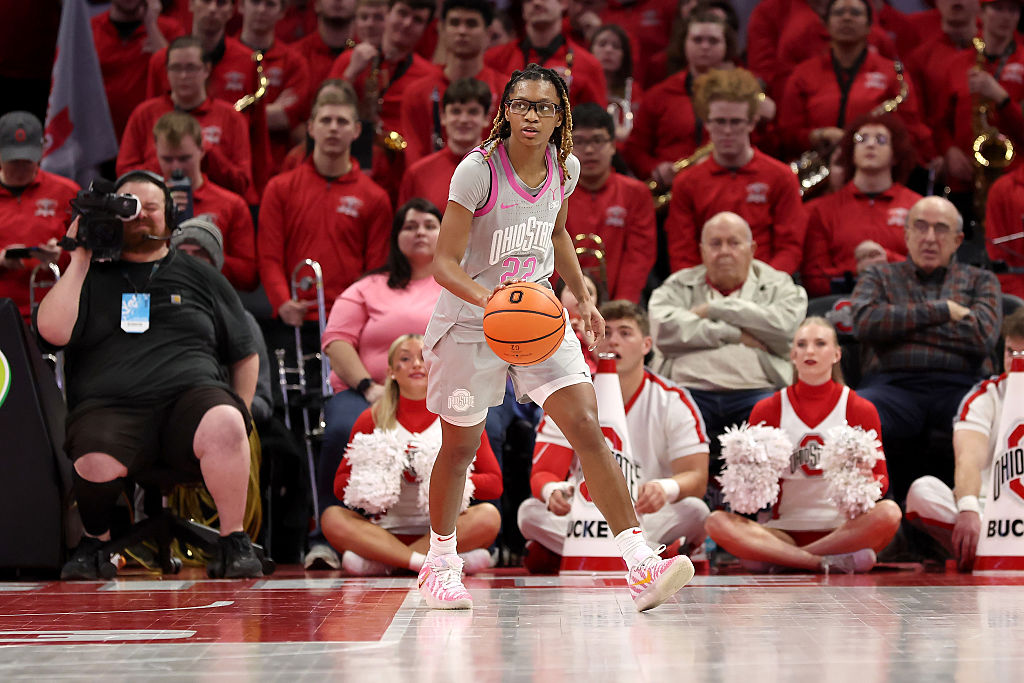The only thing more difficult than listing all the superlatives for Notre Dame’s Olivia Miles might be guarding her. The rising sophomore is coming off of a freshman season in which she led the Irish back to the NCAA Tournament for the first time since 2019 and within a minute of the Elite Eight.
Big things are undoubtedly in store for Miles after she finished second in the country in assists per game with 7.4 and recorded a triple-double in her first NCAA Tournament game. She also received votes for the AP’s preseason All-America team. With the 5-foot-10 guard orchestrating the offense, Notre Dame enters the season ranked No. 9 in the AP Poll.
Just Women’s Sports’ Calvin Wetzel sat down with Miles to break down film from 2021-22 and talk about what she learned as she heads into a new season with high expectations.
This interview has been lightly edited for length and clarity.
CW: Your team runs this play a lot of times late in the clock, where you make this little hand signal. It’s basically a ghost screen pick-and-pop … What can you tell me about this play?
OM: This is one of our late shot-clock plays. It’s a very quick hitter. It’s actually pretty hard to guard when you get two shooters or a dynamic guard and a shooter that come off the brush screen because it just confuses the defense since it’s not exactly a screen. They’re usually wide open or I take it to the basket, so it really depends. It’s just a good quick hitter play. The Warriors run it a lot actually, where they’ll have two guards coming off. It’s just very hard to guard the drive and the three at the same time.
CW: Here, I like this play because you have Maddy [Westbeld] setting the screen and it looks like the opponent is jamming her. The defender can’t stay too far off of Maddy because she’s a shooter, so that lets you get downhill. When you have those shooters setting screens for you, how much does that help you?
OM: It’s so hard to guard when you have so many things to worry about. Having Sonia [Citron], having Dara [Mabrey], having Maddy, and obviously we had Sam [Brunelle] in our offense and those kind of weapons around me — I can see where the defense is rotating, like I did there, and I knew they were gonna come on Maya because she was having a good game I remember. So it’s easy to read when you have so many great shooters around you and they can’t really guard it.
CW: On this one, Miami gets switched and tries to scram switch out of it at the end, but it’s too late. Maddy has a smaller player on her, and it looks like you’re aware of that from the start. You don’t even have the ball yet, but it looks to me like you want to get the ball into Maddy and exploit that mismatch. When you see a switch like that, is that your mindset, where you’re hunting to get the ball into the mismatch, and if it’s not there, to come off some other action to find it open?
OM: We practice mismatches all the time — I feel like that’s one of our points of emphasis that we work on all the time in practice because we have bigger guards like Maddy who do get switched onto guards a lot. It all just stems from the way we screen and the way people have to guard us. Oftentimes people will switch onto Maddy on the pop or on the rolls, so our coach really emphasizes trying to get the ball inside. In that play, they switched a little late so it was kind of easy to see, but also Maddy’s just such a big target that I can see her out of my peripheral vision and whatnot. She’s just always there and in a great position to get the ball.
I feel like those kinds of plays I make up on the fly. I’m not really thinking about it too heavily, but usually I can identify the mismatch right away and we look to hit that and exploit that immediately.
CW: I have a few clips of you attacking hedges. Are you reading something when they hedge on whether to get downhill around it, hit the roller, split it, whatever? Or is it more like, you’ve been playing basketball so long you have that feel where you don’t even really need to think about it?
OM: l think most of what I try to do kind of happens on the fly, but a lot of it comes from watching film and watching the other team and their tendencies around the way they hedge. Usually I know with bigger posts, I can make my way around. What I’ve noticed with the more athletic posts is they like to try and come out a bit too high, so that’s when I like to split. So it’s all personnel, and it’s all knowing who can do what and who’s guarding you in that moment. I would say it’s, like, 70 percent me watching film and then 30 percent me making it up and just taking what the defense gives me in the game.
CW: So, you watch film beforehand and know some of their tendencies so you’re mentally prepared for a lot of that heading into the game?
OM: Yeah. Me and my position coach, we do film sessions just the two of us to break down what I’m gonna get and the areas that I can score in and work on that in practice. We drill out a lot of different personnel and playing to that with our advantages. What big can do what? Who’s good at this and that? So I feel like I’m prepared when it comes to the actual game.
CW: This one in particular I love. So, you have Mabrey cutting. It looks like she sees her defender here not recognizing her. Her defender’s focused on you mostly. And then she cuts and you see that. Obviously you’re a great ball handler and passer — you draw a lot of attention. Do you feel like you and your teammates have that chemistry where, when one of their defenders gets caught ball watching, you can make eye contact or they can make that back cut and know you’ll find them?
OM: Yeah, that play was complete luck. I honestly did not know what I was gonna do with the ball, and then I saw her and I was like, “Thank the lord.” But I feel like a lot of our team, we have such great chemistry with each other. And another point of emphasis for our coach is to just keep moving. Keep moving regardless of how much time is left on the clock. Sonia does a really, really good job of that. Her and I connect on so many backdoors and so many sneak plays like that. And Dara did a good job here.
But I feel like, to answer your question, our team — they’ve kind of gotten used to the way I play and the things that I see, and those cuts in particular are passes that I like to throw a lot, so they’re getting used to cutting like that.
CW: This one is an absolute dime. You hit Maya on the fast break, and I don’t know how that pass gets through. Watching this back, I paused it right here when you first start making the pass, and I’m counting up one, two, three, four, five red jerseys. And then there’s Maya. It doesn’t seem open, but you sneak in the pass an inch above the defender’s fingertips. What gives you the confidence to be able to make a pass like that?
OM: I mean, a lot of times it goes wrong, so I definitely kind of question myself at points. But at the end of the day, I feel like I know … and at this point in the season, I learned who I could trust and count on to catch those passes. And I feel like Maya, I knew her body, I knew her athleticism, I knew her speed, I knew she was gonna be able to rise up and get that one. And she was also looking at me like she wanted it, so I was like, “Why the heck not? Let me just heave it downcourt.”
But I feel like knowing personnel is super important, and if it were a different one of my teammates, I probably wouldn’t have thrown it. But I was like, “You know what, I’m just gonna give it a go. Why not?” It could either be a really, really good layup, or a turnover. It’s high risk, high reward.
CW: People talk about your offense all the time, but I feel like something you don’t get as much credit for is that you have good hands on defense. So on this one, you wait a little bit for the player to turn and then you time it up perfectly so you get your hands in there on the dribble without fouling. Is that another thing where you know their tendencies from film? Or do you work on timing those up and swooping in at the right moment? Or is all of that natural?
OM: Part of it is definitely tendencies — I like learning what other people are gonna do. I don’t study bigs that much; I more so study guard tendencies. But I know that, especially when we’re in zone, a lot of the bigs like to turn their back so it’s easy to get those pluck steals really quick or catch them off guard when they turn around. I feel like I’ve always had good reflexes and good hand speed, and that’s helped me get quite a few steals. I definitely could be a little better — I’m aiming for more steals this year — but I feel like that’s just something that I’ve always had. I know the timing and I’ve been playing basketball long enough to know what people like to do, so it’s easy for me to predict in certain situations where I can get the ball. Just scanning the floor, similarly to offense.
CW: I had one more question for you, unrelated to the clips. Did the extra spring semester you got for COVID-19 eligibility help you prepare for the game at the Division I level?
OM: It definitely helped me prepare more. I obviously didn’t really get that many minutes on the floor like I did this past season, but I feel like just knowing the ins and outs, starting to get that knowledge of the game, knowledge of our playbook, of our teammates a little earlier helped me and my teammates adjust to each other better. That year definitely helped me mature mentally, physically, emotionally in aspects of the game. I came in the first game [last season] more confident than another freshman who might have been a little nervous for their first game. So, while I do still get nervous and I do still get worked up for games, I feel like having that intro with no pressure on me, and just using that as a learning experience, helped me to settle my nerves and be more familiar with our playbook, our coach, and just play the game better, honestly.
CW: Are you able to manage those nerves better now? Have you learned some strategies on that?
OM: Yeah, I mean I’m still working on it, but it’s definitely something that has progressed. I’ve found that when I’m nervous, I’ve just told myself that it’s a good thing because I care and I wanna do well. And I turn those feelings into more of an excited feeling so I can just convince my brain that we’re on the biggest stage, I’m having fun, it’s just a sport. At the end of the day, I’m still the person that I am and still have the people around me that I love, so whatever happens on the court happens on the court. I’ve just been working on my mindset a lot, and I feel like that’s helped me prepare before games. And even more so this year, I hope it helps me play on a higher level than I did last year.
Calvin Wetzel is a contributing writer at Just Women’s Sports, covering basketball and betting. He also contributes to Her Hoop Stats, CBS SportsLine and FiveThirtyEight. Follow him on Twitter at @cwetzel31.




